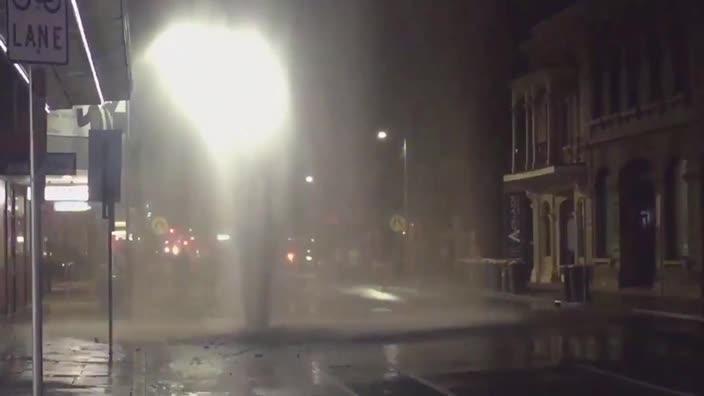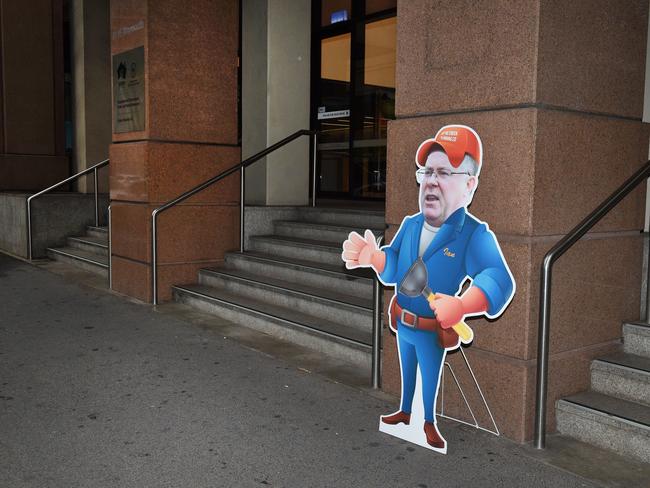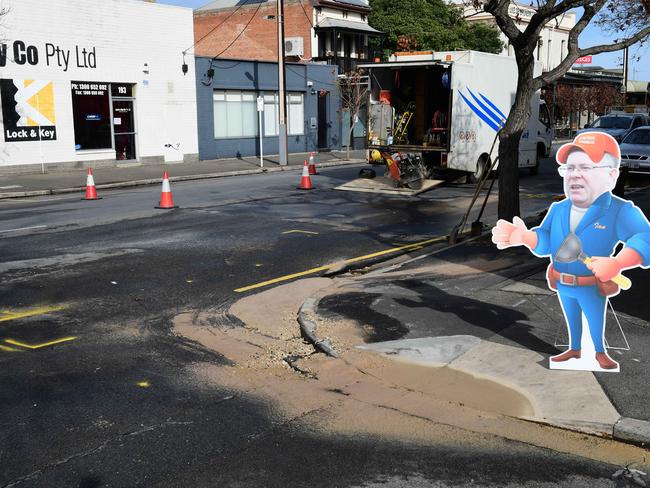Burst water mains not because of cutbacks to pipe maintenance, Water Minister Ian Hunter says
WATER Minister Ian Hunter has rejected claims of cutbacks to pipe maintenance, but has been unable to reveal plans for the next three years.
SA News
Don't miss out on the headlines from SA News. Followed categories will be added to My News.
- Water Minister told he must communicate better
- Minister’s not turning up to burst mains — so we’re bringing the cardboard cutout
- Burst water main claims excavator that falls into hole
- Watered down — Ian Hunter ignored criticism of SA Water in report he cited
- Dramatic video: Huge gusher in heart of the city
WATER Minister Ian Hunter has rejected claims of cutbacks to pipe maintenance, but has been unable to reveal plans for the next three years.
The Opposition on Sunday produced State Budget documents it claimed showed there has been cutbacks from $47 million to $32 million this year in the SA Water pipe network renewal program.
Opposition infrastructure spokesman David Pisoni said this coincided with a surge in pipe bursts which were inconveniencing motorists and led to the flooding of some homes and businesses.
“The cut in funding for upgrading SA Water’s pipeline network is clearly a contributing factor in the spate of burst water mains that have hit Adelaide this year,” Mr Pisoni said.
“The damning information comes to light after months of damaging pipe bursts in the CBD and suburban Adelaide have damaged homes, cars, roads and led to lengthy delays.”

Mr Hunter, who has failed to attend burst water mains to speak with affected home and business owners, said the State Government’s pipe upgrade program was a total of $113 million over three years, and money was spent as and when it was needed.
He said the length or complexity of a pipe fixing program in a single year could cause fluctuations in how much money was spent.
“With expenditure on pipe renewal, which SA Water does every single year … we know that we’ve been able to keep the number of bursts right down and incredibly stable,” Mr Hunter said.
“The number of bursts aren’t rising. There has been no change this year from last year.
“We understand the frustration this causes people, completely we do. But at the end of the day, you want to have a water system that minimises the number of bursts. That’s what we’ve got in SA.”
Mr Hunter refused to allow a cardboard cutout substitute of him into his press conference on Sunday.
The Advertiser has taken the substitute Mr Hunter to burst mains over the past week to highlight the minister’s absence.
But Mr Hunter was prepared to joke about it.

“It’s extremely flattering. I think it’s taken 25 kilos off of me,” he said.
“If The Advertiser, when they finish with it, could hand it back to me then I’d like to use it for campaign posters for my next election.”
Next month, the Essential Services Commission of SA is set to rule on a new water billing regime for the next three years. It will decide how much SA Water can raise from customers for the next three years and have oversight of its spending plans which include infrastructure upgrades.
Currently, it is expected to lead to an average cut to bills of about $45 per year.
SA Water’s draft business plan states it has done research showing people would be willing to pay a small amount more on their bill if it were likely to halt the number of pipe bursts.
“Customers told us they are keen for us to reduce bursts and water loss from our network and they support installation of additional pressure reducing valves to modulate water pressure in the network at a cost of $1.30 per year on a typical bill,” the business plan says.

It proposes that this could be achieved by installing 11 water pressure reducing valves in the metropolitan area to reduce strain on the network and potentially cut the number of bursts.
Mr Pisoni said the most significant cause of high water bills in SA was “the Weatherill Government’s decision to use SA Water as a cash cow” to prop up its struggling State Budget.
The average household water bill has increased by 241 per cent while Labor has been in power but the quality of the network had been allowed to run down, Mr Pisoni said.
“With increased financial pressure on families, South Australians should at least be able to expect that water infrastructure is maintained,” he said.


